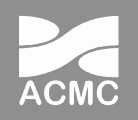| Validity of sources of information |
 |
In compilation of any report, the quality of the referenced sources is an important indicator of the standard of your work. To a first approximation, the ranking from best to worst, might be:
- Refereed journals
- The text should have been reviewed by two-four independent experts (though some are more thorough than others)
- Elsevier, Sage and Taylor & Francis Group, plus professional institutes/institutions, publications are good in the composites area.
- If the journal uses Digital Object Identifier (DOI), it is probably more reliable than (a less prestigious) one with no DOI.
- Check the acknowledgements for sponsors (commercially-sponsored research is likely to skew differently from those for environmental lobby groups)
- Do the authors clearly state testing is to recognised standards and using calibrated equipment.
- Edited books
- The text would normally be reviewed by one or more of the editors, and sometimes more widely.
- The writing and publishing process often takes 18-24 months so the text will not include recent developments.
- Research degree theses
- Normally the repository copy will have been examined and corrected before deposit.
- Monographs, theses and dissertations
- The text may, or may not, have been reviewed by colleagues/friends of the author.
- Magazines/newspapers
- Can be of very variable quality, but articles are often “dumbed down” to cater to a lay audience
- Conference papers, lecture notes and conversations with individuals
- The opinion of one individual which may be (a) biased by selective reading or personal agenda, and (b) often not subject to independent review.
- Supplier data sheets
- Assume they selectively quote the best available data, and check whether they state the standards to which test were conducted
- Webpages
- These can vary from publisher online versions (see refereed journals above) to biased views of individuals with a specific “agenda”. Judgement needed!
- Discussion fora (forums)/internet blogs
- Like webpages these can be very variable, but if truly open then rogue information will get critical feedback.
More information:
- Nedelina Tchangalova, What is a "Good" Source? Determining the Validity of Evidence, University of Maryland, 27 May 2014.
- Roger Pierce, Chapter 7 Evaluating Information: Validity, Reliability, Accuracy, Triangulation, in: Research Methods in Politics: a practical guide, Sage Publications, London, April 2008, pp 79-99. ISBN: 978-1-412-93551-7.
Created by John Summerscales on 13-Dec-20 and updated on
13-Dec-2020 21:59. Terms and conditions. Errors and omissions. Corrections.

